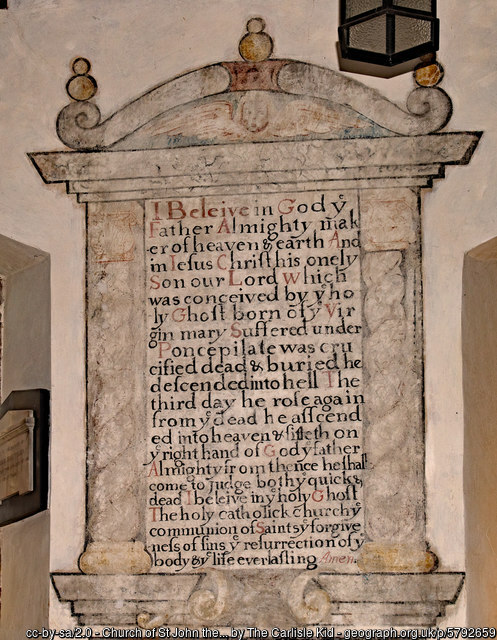
Church of St John the Baptist, Stokesay
© The Carlisle Kid, licensed for reuse under Creative Commons Licence.
Today’s hymn is the last in the series for Trinity week, and the third in a row for hymnwriter Timothy Dudley-Smith. It’s a paraphrase of the Apostle’s Creed (the shorter of the two forms of the creed usually used in church). The suggested tune is Lux Eoi, by Arthur Sullivan, perhaps better known for his light operas but who also composed some good church music.
The Creed summarises the beliefs of the mainstream churches: those who agree on its wording generally accept each other as fellow Christians, even if they don’t always extend this acceptance to recognising each other’s ministerial orders and sacraments, but that’s another matter.
Although the words refer to all three persons of the Trinity, the bulk of them are about Jesus the Son of God, which probably reflects the difficulty the early Church had in understanding him. Where people agree on something, often only a short form of words is needed, so “We believe in God, the Father almighty, maker of heaven and earth” is short enough to convey what we understand by the Creator. The “how” of creation didn’t really get debated until long after the Creeds were agreed.
When people disagree on something, however, it usually leads to writing rules down in great detail, so there is much here about exactly what the Church (i.e. the original Eastern church) thought about Christ. We have his sonship of God, born of a virgin by the Spirit, crucified, dead, buried, risen and ascended, and coming again in future to judge us. The Nicene Creed goes into much more detail (God from God, light from light, very God of very God). If you disagree with this, you’re a heretic. Some churches still find any dissent from this difficult to accept within their ranks; others are more open to debate on those issues (perhaps especially on the virgin birth and the nature of Christ’s future reign).
The Apostles’ Creed simply states in regard to the Holy Spirit that we believe in Him. This lack of further description of the Spirit’s work compared with the obsession with the detail of the exact nature of Christ’s relationship with the Father, does make me wonder whether the Church Fathers actually experienced the Holy Spirit for themselves? We will probably never know.
As I think I have said previously, I admire the ease and fluency of speech that Timothy Dudley-Smith gets into his hymnwriting, and I thought this hymn was a very well-crafted piece of work which both sticks close to the text and ideas of the Apostles’ Creed and thoroughly respects the rhyme and rhythm structure needed for singing. Perhaps the only poorly-fitting word is “upon” (at the start of the last line of verse 1), in which the stresses fall wrongly – “unto” would have been better (in my opinion).
Stephen is right that the details about the Holy Spirit are not the point in the Apostles’ Creed: the last six clauses stand like bullet points, and I have seen them grouped together in pairs, giving the implication that:
– the Spirit’s ministry creates the Church,
– the saints are in communion because the forgiveness of sins unites them, and
– the resurrection of the body is the essence of the everlasting life of the individual.
But I don’t really think that’s a right emphasis, and I was pleased to see that Timothy chose the “1,2,3” scheme instead, in which
– the Holy Spirit is the third person of the Trinity in which we believe,
– the “Church” consists of the “Communion of Saints” so the saints departed are an extension of the saints gathered (lines 2-4 of his final verse), and
– the forgiveness of sins by the death and resurrection of Christ is the gateway into the everlasting life (lines 5-8 of that verse).